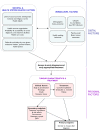African Breast Cancer-Disparities in Outcomes (ABC-DO): protocol of a multicountry mobile health prospective study of breast cancer survival in sub-Saharan Africa
- PMID: 27554102
- PMCID: PMC5013398
- DOI: 10.1136/bmjopen-2016-011390
African Breast Cancer-Disparities in Outcomes (ABC-DO): protocol of a multicountry mobile health prospective study of breast cancer survival in sub-Saharan Africa
Abstract
Introduction: Sub-Saharan African (SSA) women with breast cancer (BC) have low survival rates from this potentially treatable disease. An understanding of context-specific societal, health-systems and woman-level barriers to BC early detection, diagnosis and treatment are needed.
Methods: The African Breast Cancer-Disparities in Outcomes (ABC-DO) is a prospective hospital-based study of overall survival, impact on quality of life (QOL) and delays along the journey to diagnosis and treatment of BC in SSA. ABC-DO is currently recruiting in Namibia, Nigeria, South Africa, Uganda and Zambia. Women aged 18 years or older who present at participating secondary and tertiary hospitals with a new clinical or histocytological diagnosis of primary BC are invited to participate. For consented women, tumour characteristics, specimen and treatment data are obtained. Over a 2-year enrolment period, we aim to recruit 2000 women who, in the first instance, will be followed for between 1 and 3 years. A face-to-face baseline interview obtains information on socioeconomic, cultural and demographic factors, QOL, health and BC attitudes/knowledge, and timing of all prediagnostic contacts with caregivers in orthodox health, traditional and spiritual systems. Responses are immediately captured on mobile devices that are fed into a tailored mobile health (mHealth) study management system. This system implements the study protocol, by prompting study researchers to phone women on her mobile phone every 3 months and, failing to reach her, prompts contact with her next-of-kin. At follow-up calls, women provide updated information on QOL, care received and disease impacts on family and working life; date of death is asked of her next-of-kin when relevant.
Ethics and dissemination: The study was approved by ethics committees of all involved institutions. All participants provide written informed consent. The findings from the study will be published in peer-reviewed scientific journals, presented to funders and relevant local organisations and at scientific conferences.
Keywords: Africa; EPIDEMIOLOGY; Survival.
Published by the BMJ Publishing Group Limited. For permission to use (where not already granted under a licence) please go to http://www.bmj.com/company/products-services/rights-and-licensing/
Figures



References
-
- Sankaranarayanan R, Swaminathan R. Cancer survival in Africa, Asia, the Caribbean and Central America. 2011. Sankaranarayanan, R and Swaminathan, R (Eds). IARC Scientific Publications No. 162. Lyon: International Agency for Research on Cancer IARC Sci Publ 2011;162:1–5. - PubMed
-
- Popoola AO, Ogunleye OO, Ibrahmi NA et al. Five year survival of patients with breast cancer at the Lagos State University Teaching Hospital, Nigeria. J Med Med Sci Res 2012;1:24–31.
Publication types
MeSH terms
Grants and funding
LinkOut - more resources
Full Text Sources
Other Literature Sources
Medical
Research Materials
